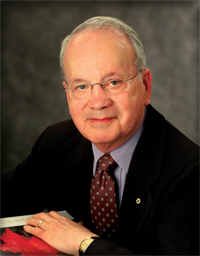Page Content
 Myer Horowitz has created quite a legacy in education, from kindergarten to postsecondary.
Myer Horowitz has created quite a legacy in education, from kindergarten to postsecondary.
Horowitz was born in Montreal, in 1932. He received a B.A. in 1956 from Sir George Williams College (now Concordia University), and an M.Ed. from the University of Alberta in 1959. In 1960 he joined the Faculty of Education at McGill University and in 1965 earned a doctorate of education in elementary education, from Stanford University.
In 1969 Horowitz left McGill for points west—Edmonton to be exact, where he was appointed chair of the U of A’s Department of Elementary Education. He went on to hold a number of academic positions at the U of A, including dean of education (1972–75) and vice-president (academic) (1975–79). Then, on August 1, 1979, he was appointed the ninth president of the University of Alberta, a post he held for 10 years. As Horowitz guided the university through a turbulent decade, he never stopped advocating for universally accessible early childhood services. In 1999 Myer Horowitz was named president emeritus at the University of Alberta.
Horowitz also had a long association with the Alberta Teachers’ Association (ATA) and other education groups. He is a former president of the ATA’s Early Childhood Education Council, the M. E. Lazerte Chapter of the Canadian College of Teachers, the Canadian Committee on Early Childhood and the Canadian Bureau for International Education.
Horowitz remains active in postsecondary education. He is an adjunct professor of education studies at both Royal Roads and the University of Victoria, and is the acting director of the Centre for Early Childhood Research and Policy, also at UVic. And his connection with the University of Alberta continues—he is special advisor to the Centre for Research for Teacher Education and Development.
Horowitz also remains active in his communities, with appointments in Edmonton and Victoria. He also works with the Winnifred Stewart Foundation, the Child and Adolescent Services Association, Success by 6, the Salvation Army, Goodwill Industries and the YMCA.
When asked why it is important for teachers to be involved in shaping society, he wrote: I have felt that it is also important that, beyond our work in our classrooms and schools, we be advocates for positive change, especially in relation to children.” He went on to say, “I continue to get involved in projects and activities where I feel there is a need and where I think I can make a contribution. It is also important to me that I do things that I enjoy doing. In other words, there is something important in it for me too.”
Nor surprisingly Horowitz has received many honours—he has seven honorary degrees, is an Officer of the Order of Canada (1990) and in 2012 received the Queen Elizabeth II Diamond Jubilee Medal.
But when asked what he is most proud of, Horowitz hesitates: “That is a difficult question for me to answer because I'm proud of many things, especially what some of my students have accomplished over the years. That is so not only for many students I have taught at universities, but also a number whom I taught in the 1950s at the elementary and high school levels. At a more personal level I'm proud that I became a full professor at McGill at the age of 34; I'm proud that I have received honorary degrees in each of the decades from the 1970s to today; and I'm proud that the ATA and other teachers’ organizations have honoured me a number of times.”
It was the least we could do, Dr. Horowitz.
